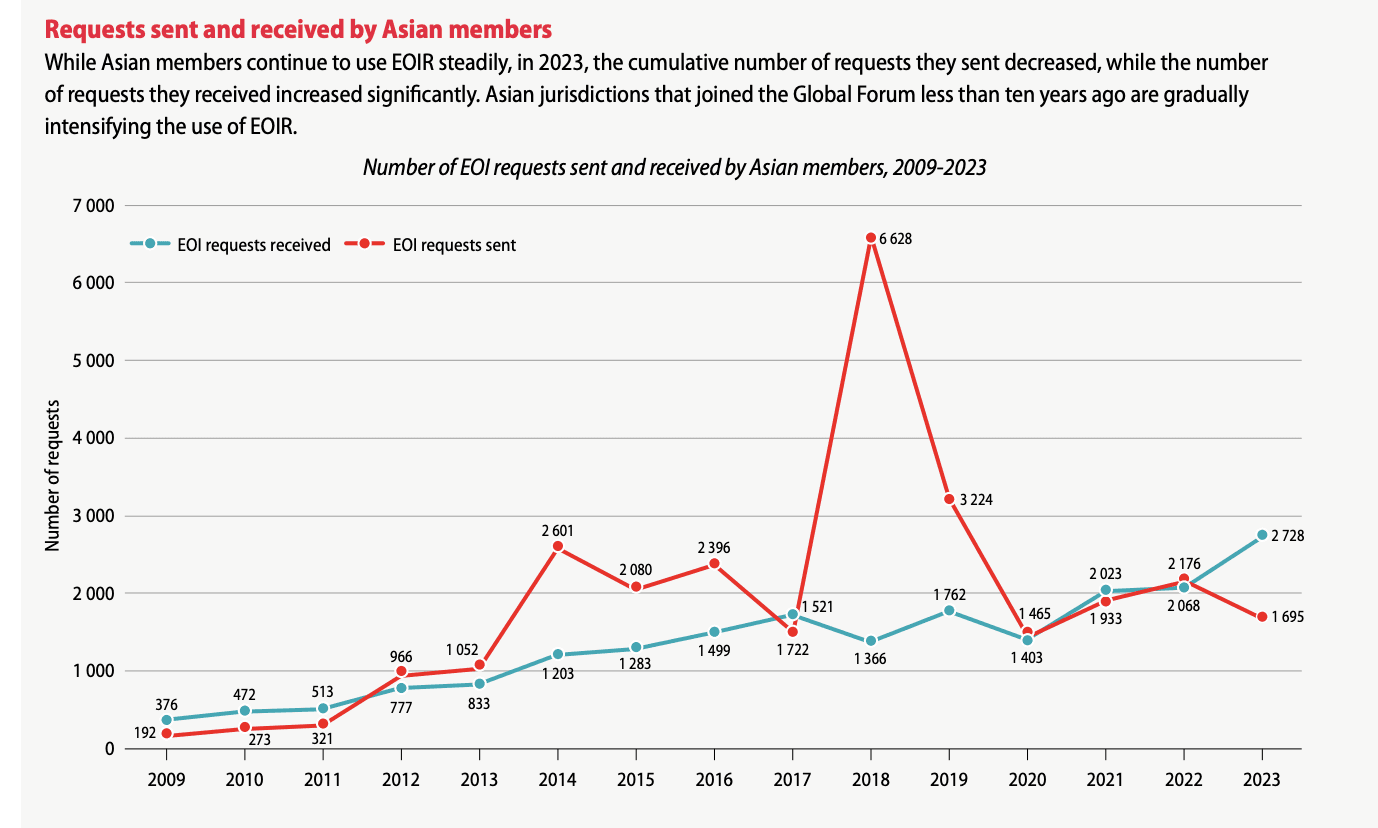
The Organization for Economic Co-operation and Development (OECD) has published a report on Tax Transparency pertaining to Asian Countries that are global members committed to exchanging data under Exchange of Information (EOI) under Common Reporting Standards (CRS).
For better compliance with Tax Transparency among Asian Countries, the Asian Initiative Framework was formed in 2022, with 22 countries participating as of 2023. These countries ratified the Convention on Mutual Administrative Assistance in Tax Matters (MCAA) for mutual co-operation in Tax Transparency.
Main Action Points
The main action point of the Asia Initiative is that all members should establish a legal, organizational, and monitoring framework to obtain the greatest benefit from EOI. This includes:
- A sufficiently broad network
- Adequately staffed EOI units
- Officials with appropriate knowledge of EOI standards and their implementation
- Documented processes to ensure consistent implementation across EOI officials
- Coordinated collaboration between relevant stakeholders through signed Memorandum of Understanding Agreements
- Tracking and impact assessment tools
Progress in International Tax Transparency
This report brings out the progress made by Asian countries under International Tax Transparency in the following domains as effective measures:
- Establishment of Legal Framework
- Capacity Building with Adequate Infrastructure
- Domestic Resource Mobilization
- Information Security Management - Confidentiality and Data Safeguard Framework
Complementary Actions and Achievements
Wider Use of EOI Data
As of 2023, Asian members of the Global Forum have 3,005 bilateral EOI relationships, with 2,740 in line with the standard, 97% of which rest only on the MAAC.
Effective Use of CRS Data
Asian Global Forum members have established strong EOI units facilitated by trained staff, procedural manuals, and monitoring tools to guarantee timely responses and appropriate procedures. Key findings include:
- Twelve Asian members reported using CRS data to support ongoing tax activities, such as risk assessment, tax audits, tax collection, pre-filling of tax returns, or taxpayer notifications.
- 218 officials are fully dedicated to EOI work.
- Recent joiners of the Global Forum have established a stand-alone EOI function within the tax administration.
- Four more countries adopted a monitoring tool to track EOI activity in 2023, reaching a 95% implementation level.
Recovery of Tax Claims
- 1.8 billion EUR additional revenue was achieved in 2023 due to Exchange of Information Requests (EOIR).
- 22 billion EUR additional revenue was achieved from 2009 to 2023 due to EOIR.
- After implementing CRS and AEOI, the number of EOIRs increased, resulting in additional revenue through synergy between AEOI and EOIR.
- The level of matching data improved to 60% in 2023 from 35% in 2019.
EOI on VAT/GST
The member countries of the Asia Initiative plan to bring VAT/GST under the EOI regime to tackle tax evasion and Illicit Fund Flow (IFF).
Other Forms of Administrative Tax Cooperation
Dissemination of knowledge for tax compliance and EOI is essential for tax cooperation. The forum has taken several initiatives, including:
- Over 1,000 officials from the 22 Asian Global Forum members attended 30 training and sharing experience events organized by the Global Forum Secretariat.
- 47% of Asian participants in capacity-building activities were female officials.
- 16 Asian jurisdictions benefited from bilateral technical assistance.
- 17 participants from 8 Asian members of the Global Forum participated in the nine-month Train the Trainer program,
- The laureates conducted conducting 16 local training sessions and training 557 officials.
- All 171 members of the Global Forum, including the 22 Asian members, are committed to implementing the EOIR standard, which includes three pillars of availability, access, and exchange of data.
Other Areas of Interest
- The Crypto-Asset Report Framework (CARF) is planned to be brought under EOI by OECD, with 6 out of the 58 signatories from Asia.
- Asian participation in various forum bodies and capacity-building activities is commendable.
Beneficial Ownership Identification
While significant progress has been achieved, the identification of beneficial ownership needs improvement. Jurisdictions have four main options for ensuring the availability of beneficial ownership information:
- Framework for anti-money laundering and countering the financing of terrorism (AML approach)
- Beneficial ownership information kept by the entities themselves (entity approach)
- Central register of beneficial owners (central register approach)
- Beneficial ownership information held by the tax authority (tax authority approach)
It is suggested that multiple methods of implementation would help jurisdictions identify reportable beneficial owners.
India’s Role
- India is an early adopter of EOI, exchanging data under AEOI since 2017, which helps ensure better tax transparency, tackle tax evasion, and Illicit Fund Flow, and increase domestic tax revenues.
- India has secured an “In Place” rating under “Legal framework” and “On Track” under “Initial effectiveness review.”
- India has EOI arrangements with 171 countries, the highest among Asian countries.
- India has been a member of all Asia Initiative programs.